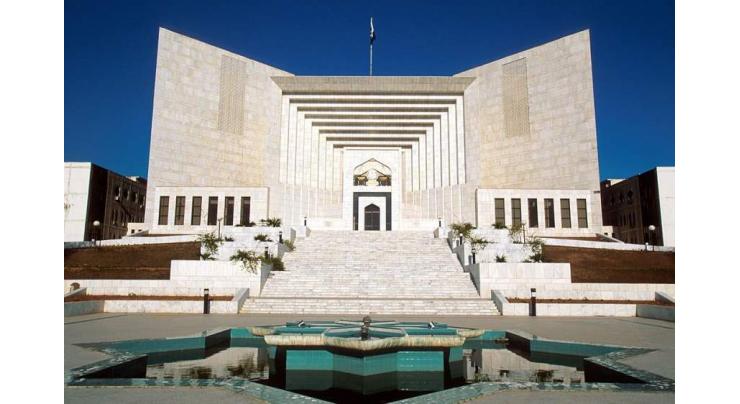
SC Declares 2023 Review Act Unconstitutional
Abdullah Hussain (@Abdulla99267510) Published August 11, 2023 | 03:24 PM

The top court has dashed the hopes for Nawaz Sharif and Jahangir Khan Train.
ISLAMABAD: (UrduPoint/UrduPoint / Pakistan Point News-August 11th, 2023) In a unanimous decision, the apex court declared the Supreme Court (Review of Judgments and Orders) Act 2023 as "unconstitutional" on Friday.
This ruling dampened the hopes of ex-PM Nawaz Sharif and Jahangir Tareen, who aimed to challenge their lifetime disqualifications.
Both leaders were disqualified under Article 62 of the Constitution by the SC. Had today's verdict favored the petitions, they would have had an opportunity to challenge their disqualifications, considering their political ambitions ahead of the upcoming general elections after the National Assembly's tenure completion.
A three-member bench led by Chief Justice Umar Ata Bandial, alongside Justice Ijazul Ahsan and Justice Munib Akhtar, had reviewed several petitions challenging the late May-enacted law. Various parties, including Ghulam Mohiuddin, Zaman Khan Vardak, the Jurists Foundation represented by CEO Riaz Hanif Rahi, and the Pakistan Tehreek-e-Insaf (PTI), contested the validity of the act.
Attorney General for Pakistan (AGP) Mansoor Usman Awan urged the court to dismiss the pleas, asserting that the act expands the court's jurisdiction without limiting its powers.
On the other hand, PTI lawyer Ali Zafar, speaking on behalf of the party's Secretary General Omar Ayub, argued that altering the apex court's powers required a constitutional amendment rather than mere legislation.
After six hearings from June 7 to June 19, the bench reserved its verdict on June 19. Chief Justice Bandial announced the decision in the presence of the AGP, petitioners, and numerous lawyers.
He stated, "The Supreme Court Review Act is against the Constitution," emphasizing the unanimous nature of the decision.
The comprehensive 87-page order invalidated the Act, deeming it null and void due to its conflict with the Constitution and legislative competence of Parliament.
Addressing the maintainability of the petitions, the order cited Article 184 of the 1973 Constitution, asserting the Supreme Court's original jurisdiction.
It highlighted that the Act seemed to impact judicial independence, a key feature of the Constitution, and thereby raised questions of public importance under Article 184(3).
The order further clarified that the Supreme Court has the constitutional mandate under Article 184(3) to address matters related to the enforcement of fundamental rights.
It emphasized that protecting fundamental rights is the judiciary's duty and labeled the Act an intrusion into the Constitution's fundamental features.
The order rejected the AGP's argument regarding appeal or review availability against the court's judgment or order under Article 184(3). It disagreed with the notion that the Act addressed this concern adequately.
The order underlined that Parliament lacks the authority to legislate on matters related to the Supreme Court's jurisdiction and powers.
It stated that any legislation attempting to enlarge the court's jurisdiction infringes upon judicial independence and misinterprets the Constitution.
The Act, comprising 7 Articles, aimed to enhance the Supreme Court's review powers. However, the apex court's ruling deemed it unconstitutional, thereby nullifying its provisions.
Related Topics
Recent Stories

Over 37% Tobacco tax increase suggested to save lives, boost revenue

Mohsin Naqvi has offered a substantial incentive, pledging $100,000 to every pla ..

Citizens join Al Barsha Police in “An Hour for Dubai” Initiative

Art can be a powerful tool to relieve stress, Experts say at Sharjah Children’ ..

Currency Rate In Pakistan - Dollar, Euro, Pound, Riyal Rates On 5 May 2024

Today Gold Rate in Pakistan 05 May 2024

Bugti assures transporters for addressing their problems

Deputy Prime Minister and Foreign Minister, Mohammad Ishaq Dar meets foreign min ..

3 drug peddlers arrested, hashish recovered

1496,990 children given polio drops in five days: DC

Six terrorists killed, hideout busted in N Waziristan IBO: ISPR

Pakistan, Qatar agree to further expand trade, investment ties
More Stories From Pakistan
-
Bilawal felicitates Naila Kiani
27 minutes ago -
Bilawal felicitates newly elected ANP President Aimal Wali
27 minutes ago -
Water flows gradually rise at Kotri barrage
37 minutes ago -
Hockey team performance reflects selection on merit; Rana Mashhood
47 minutes ago -
SSP visits Sweet Home
47 minutes ago -
CDA hosts successful Taekwondo competition for students
47 minutes ago
-
DPO holds open court
57 minutes ago -
Man killed in brawl
57 minutes ago -
KP people still await change: Azma Bukhari
57 minutes ago -
LESCO collects over Rs 3.25m from 53 defaulters in 24 hours
57 minutes ago -
Awami Sculpture Garden to be set up at Nasser Bagh
1 hour ago -
Oghi police apprehend step-mother's killer within 24 hours
1 hour ago